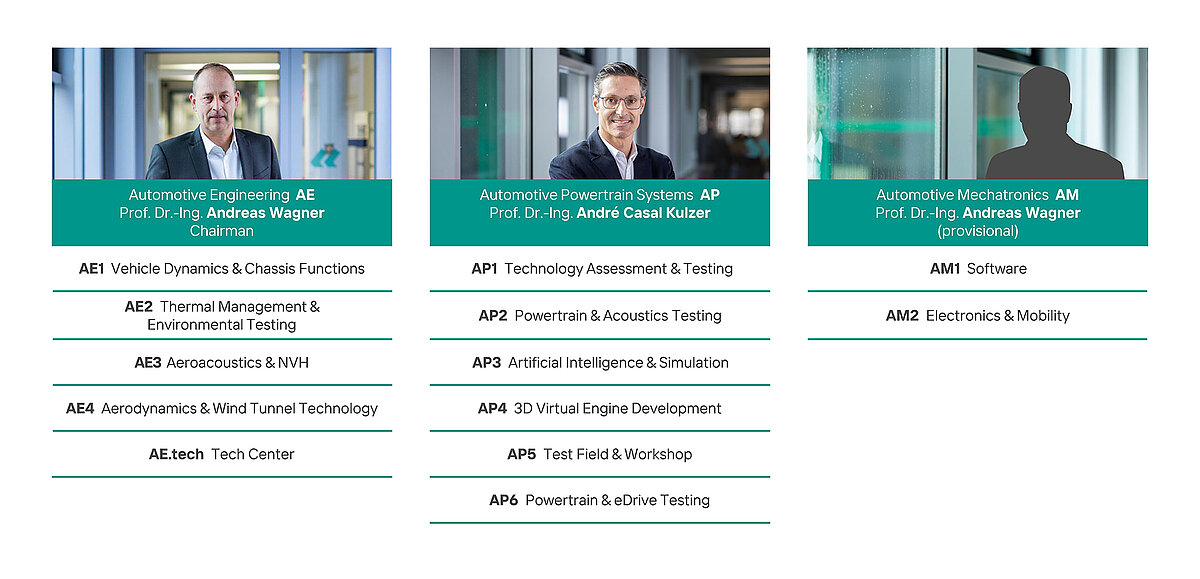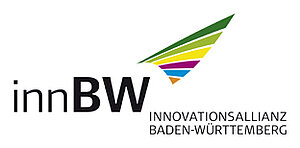About us
Exceptional expertise and a unique range of highly-specialized test benches and self-developed measurement, testing and simulation methods make the independent Research Institute for Automotive Engineering and Powertrain Systems Stuttgart (FKFS) a sought-after partner in the international automotive industry. Around 180 highly-qualified and motivated employees work to solve complex and demanding problems; undertaking research and development projects in the fields of Automotive Powertrain Systems, Automotive Engineering and Automotive Mechatronics.
With its outstanding infrastructure and interdisciplinary approach, the institute is ideally equipped to handle the challenges of mobility in the future.
Founded in 1930 as an independent foundation under civil law, FKFS cooperates closely with the Institute for Automotive Engineering Stuttgart (IFS) at Stuttgart University. The three members of the FKFS Board of Management are simultaneously also the three Chairs of IFS.
Click on English subtitles for a better understanding.
Our Values
We, the employees of the FKFS,
- combine the requirements of the industry with the findings of science
- research and develop in the service of the automotive industry
- meet the requirements of our clients dynamically and flexibly
- we guarantee our clients integrity, reliability and quality
- support the next generation of scientists within our projects
- strengthen the reputation of the University of Stuttgart in research and teaching
- are responsible for our results to society and politics
- respect foreign cultures and equal opportunities between the sexes
- cultivate a working atmosphere characterised by honesty, fairness, credibility, justice, collegiality and open communication
Our References

Board of Trustees
| Name | Organisation | Position (in German) |
| Prof. Dr.-Ing. Stefan Böttinger | Universität Hohenheim | Leiter FG Grundlagen der Agrartechnik |
| Markus Decker | Wirtschaftsministerium | |
| Dr.-Ing. Torsten Eder | Mercedes-Benz AG | Leiter Produktgruppe Antriebe |
| Dipl.-Ing. (FH) Anke Kleinschmit | ||
| Cathrin Lind | ENGIE Deutschland | Head of Business Unit Energy Services |
| Dr. rer.nat. Friederike Lindner | Robert Bosch GmbH | Senior Vice President and Head of Business Unit Sensors and Small Control Units, Powertrain Solutions |
| Franz Loogen | e-mobil BW GmbH | Geschäftsführer |
| Dr. Sabine Lutz | FKFS | Betriebsratsvorsitzende FKFS |
| Kerstin Mayr | AVL Deutschland | |
| Prof. Dr.-Ing. Peter Middendorf | Universität Stuttgart | Rektor der Universität Stuttgart |
| Steffen Müller | NXP Semiconductors Germany GmbH | Director Systems and Applications |
| Prof. Dr.-Ing. Nejila Parspour | Universität Stuttgart | Leiterin des Instituts für Elektrische Energiewandlung |
| Jun.-Prof. Dr. Alina Roitberg | Universität Stuttgart | Institut für künstliche Intelligenz |
| Dr.-Ing. Peter Schäfer* | ||
| Meyseng Se Tchao | DEKRA Group | Vice President DEKRA Group |
| Tjark Siefkes | DLR | |
| Anna Steiger | Universität Stuttgart | Kanzlerin der Universität Stuttgart |
| Prof. Dr.rer.pol. Meike Tilebein | Universität Stuttgart, Institut für Diversity Studies in den Ingenieurwissenschaften | Director of Institute |
| Prof. Dr.-Ing. Peter Felix Tropschuh | ||
| Dr.-Ing. Dirk Walliser^ | ||
| Dr. Marco Warth | Mahle International GmbH | Bereichsleiter |
| Honorary Members | ||
| Prof. em. Dr.-Ing. Michael Bargende | Universität Stuttgart | zuletzt Lehrstuhlinhaber für Fahrzeugantriebssysteme am Institut für Fahrzeugtechnik Stuttgart |
| Prof. em. Dr.-Ing. sc. techn. Meinrad K. Eberle | ETH Zürich | zuletzt Direktor des Paul Scherrer Instituts, Villigen (CH) |
| Prof. em. Dr.-Ing. Hans-Christian Reuss | Universität Stuttgart | zuletzt Lehrstuhlinhaber für Kraftfahrzeugmechatronik am Institut für Fahrzeugtechnik Stuttgart |
| Prof. em. Dr.-Ing. Jochen Wiedemann | Universität Stuttgart | zuletzt Lehrstuhlinhaber für Kraftfahrwesen am Institut für Verbrennungsmotoren und Kraftfahrwesen (heute Institut für Fahrzeugtechnik Stuttgart) |
| Advisory Board | ||
| Martin Berger | ZF Group | |
| Christian Enderle | Dr. Ing h.c. F. Porsche | Leiter Entwicklung Antriebe |
| Prof. Giorgio Rizzoni | Ohio State University | Director Center for Automotive Research |
* = Chairman; ^= Vice Chairman;
Partner Institute IFS
The Institute for Automotive Engineering Stuttgart IFS is part of the Faculty of Design, Production and Automotive Engineering of the University of Stuttgart and deals with research and teaching in the field of automotive and engine technology. The cooperation between IFS and FKFS combines basic university research with applied contract research.
The institute has three chairs:
- Chair of Automotive Engineering by Prof. Dr.-Ing. Andreas Wagner
- Chair of Automotive Mechatronics
- Chair of Automotive Powertrain Systems by Prof. Dr.-Ing. André Casal Kulzer
IFS is also home to the University of Stuttgart's student Rennteam. As of the year 2024, the two former teams of the university, the Rennteam and the GreenTeam, have combined forces and will develop an electric racing car for the Formula Student competition in the future. Together, the two teams have brought 11 world championship titles to Stuttgart.
We are part of innBW
The Innovation Alliance Baden-Württemberg (InnBW) is an alliance of 10 application-orientated, business-related research institutions with a total of 12 institutes. Together, the 12 research institutions of innBW offer a unique range of services across the entire development process from the idea to market entry. In doing so, they orient their work to the future growth fields along which the federal state government aligns its technology policy.
As a link between science and industry, innBW brings both sides together and ensures the transfer of findings from basic research into industrial practice. The FKFS has been a member of innBW since 2020.
History
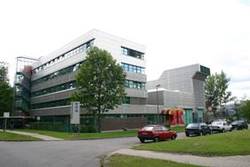


1998 - today
In 1998, Prof. Dr.-Ing. Jochen Wiedemann succeeded Prof. Essers as Chair of Automotive Engineering. In the same year, Prof. Dr.-Ing. Michael Bargende assumed the Chair of Internal Combustion Engines (since 2011 "Automotive Powertrains"). Both chairs formed the basis of the »Competence Center of Automotive Technology Stuttgart«. In 2004, Prof. Dr.-Ing. Hans-Christian Reuss assumed the Chair of Automotive Mechatronics and provided the center with the desired expansion. All three chairs are members of the Managing Board of FKFS whose chairmanship rotates every two years. Since April 1, 2019, Prof. Dr.-Ing. Andreas Wagner has been the successor of J. Wiedemann, who retired from his position as member of the Board of Management (responsible for Automotive Engineering). Since January 1, 2022, Prof. Dr.-Ing. André Casal Kulzer has been the deputy of the board area Automotive Powertrain Systems and will become Chair of Automotive Powertrain Systems in October 2022. In January 2022, Prof. Dr.-Ing. André Casal Kulzer took over the lead of the FKFS department Automotive Powertrain Systems from M. Bargende. Since October 2022, he is also the chair holder of the chair with the same name at IFS. Prof. Dr.-Ing. Hans-Christian Reuss retired on 30 September 2025.
The strength of the FKFS can be found in its test benches, which are constantly undergoing further development. In autumn 2014, the large 1:1 vehicle wind tunnel was extensively modernised. Since 2015, the institute is also equipped with the Stuttgart driving simulator, the largest of its kind at a European research facility. In May 2019, three new test stands were put into operation: a high-performance electric drive train test stand, an Handling Roadway System and a hybrid engine test stand. By taking over the Center for Climate Comfort in Filderstadt, FKFS opened a second location in July 2024. It is planned to modernize its benches and to bundle all activities in the field of Thermal Management and Thermal comfort at this location. In October 2024, the new Climate Road-to-Rig Test Bench was also inaugurated.
1971 - 1998
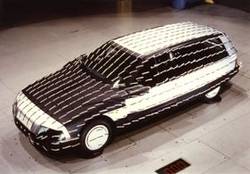
In 1971, Prof. Dr.-Ing. Ulf Essers took over the Chair of Automotive Engineering and Vehicle Engines at the University of Stuttgart and became Director of FKFS. In addition to his research and teaching duties, he planned the new institute building on the university campus in Stuttgart-Vaihingen. The rooms were occupied in 1978 and expanded in 1988 to include a wind tunnel facility with a model wind tunnel and a vehicle wind tunnel. Professor Essers established the new research focus “Noise reduction in motor vehicles and engines”. In addition to numerous projects on noise reduction on engines and tires, several low-noise commercial vehicles were developed and presented in prototypes. Modern, state-of-the-art engine test benches, equipped with the appropriate measurement technology, were the basis for successful research on engines, with a focus on the use of alternative fuels. In 1993, the vehicle wind tunnel was upgraded to an aeroacoustics tunnel, making it the most powerful aeroacoustics vehicle wind tunnel in Europe.
1945 - 1971
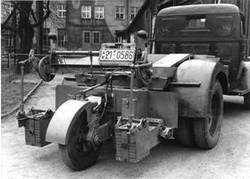
After 1945, this tradition was continued by his successor, Prof. Dr.-Ing. Paul Riekert. Following the repair of damages incurred during the war, the wind tunnel has been available to the German and European automotive industry for two decades, making a considerable contribution to the leading position of Germany in the field of vehicle aerodynamics. Professor Riekert continued his work on vehicle dynamics that he had started before the war, and he developed the »Stuttgart Friction Meter« for investigating the non-skid property of tire-road combinations.
1930 - 1945
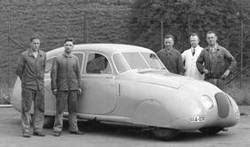
In 1930, Prof. Dr.-Ing. Wunibald Kamm, the first Professor of Automotive Engineering and Vehicle Engines at the Technische Hochschule Stuttgart, established the private and nonprofit Research Institute of Automotive Engineering and Vehicle Engines Stuttgart (FKFS). Under his direction, the FKFS became the largest and one of the leading research institutes in the field of automotive engineering. In addition to numerous projects involving motor vehicles and their engines, a major focus of his work dealt with automotive aerodynamics. Professor Kamm developed the so-called K-back car – the prototype of an aerodynamically innovative passenger car – and built the first full-scale wind tunnel for motor vehicles.



